Risky Biz
Back to Contents of Issue: August 2003
|
|
|
|
by Tony McNicol |
|
|
You might suspect a connection exists to recent enthusiastic attempts to bring casino gambling to Japan. Are avowed casino fans, such as Tokyo Governor Shintaro Ishihara, hoping to direct players' money to a more legitimate, more easily regulated industry? A group of Diet parliamentarians intend to table a bill proposal next year to legalize casinos. The pachinko industry's 50-year winning streak might be coming to an end.
On a Sunday afternoon in Shibuya the Maruhan Pachinko Tower is packed with men and women, young and old, rich and the recently slightly less rich. Open morning till night 365 days a year, the building has five floors of video games, slot machines and pachinko. This afternoon it looks like all the 445 pachinko machines are in use; the one vacant machine is being guarded by a jittery looking man who shoots suspicious glances at anyone approaching.
The pachinko industry's As forms of gambling go, pachinko isn't particularly complicated. Players insert small steel balls into a tray on the front of a kind of vertical pinball machine. The balls are automatically fired up behind the transparent face of the machine. Depending on how they fall (plus various digital and mechanical workings inside), more may emerge at the bottom. There seems little for the players to do other than to pour the balls in and try and control their trajectory by twiddling a dial on the machine's face. The balls themselves can be bought from machines in the pachinko parlor, normally for between JPY50 and JPY80 per 200 balls depending on the type of machine. Successful players are easy to spot by the stacks of overflowing trays stashed under their stools, although claiming their winnings is a slightly involved process. Because pachinko isn't technically a form of gambling, winners can't exchange their balls directly for cash. Instead they lug the trays over to special counting machines where they can exchange them for shrink-wrapped prizes. Then the prizes themselves have to be taken to a nearby building to be swapped for cash, normally well above the actual value of the items.
The pachinko industry has taken something of a hit during the recent economic downturn and seems to be trying hard to attract a new type of customer. The stereotypical disheveled chain-smoking salaryman customer is still very much in evidence, but the Maruhan tower also has a scattering of young women and couples. The latter can snuggle up in the "love seats" tucked away in one corner. An employee explains: "We want to have places where people can relax and we want to attract more ladies."
This Sunday, one TV relaxation area is occupied by a group of men perched on the tubular steel seats, slowly filling up ashtrays and watching the racing. Elsewhere are a couple of small cafŽs where customers sip their drinks, put their backs to the machines and peer out the windows.
Daikoku Denki of Nagoya is one of the biggest companies involved in the industry. Despite seeing revenue fall during the latter half of the recessionary 90s, the company posted sales last year of JPY36 billion. The market leader in the computer systems that function as the nerve centers of most pachinko parlors, the company has recently begun to branch out into pachinko games for the Dreamcast and Playstation games consoles, as well as an i-mode pachinko service that boasts around 80,000 subscribers.
Like many of Japan's successful industries, pachinko can trace its roots back to the early postwar period. In Nagoya, the Masamura trading company set up the Pachinko Museum as a tribute to the company's founder Masamura Takeuchi. Often acknowledged as the creator of modern pachinko, Masamura was one of the men who turned the prewar children's game into an adult pastime. Amid postwar shortages he cobbled together some of the first machines from old tea chests and greenhouse glass. Pachinko as a game dates back even further. The carefully documented museum has a challenge to the usual theory of pachinko's origins: While most histories describe pachinko as an adaptation of the American "Corinthian Game" (a kind of grandaddy pinball), the pachinko museum sees more in common between early machines and the vertical "wall machines" of late 19th century European penny arcades.
And so from innocent beginnings to a rather more checkered present. Media reports of tax dodging and allegations of mafia money laundering in connection with pachinko are common. According to Tanioka, "The problem with pachinko [at the moment] is that you can't control 100 percent of its income. And there are problems with tax evasion and people fiddling sales figures. So we must legislate to bring some transparency to the industry."
The failure to do that to date probably has a lot to do with the legal limbo in which pachinko finds itself. People like Tanioka see legalizing pachinko as one way of enabling regulation of the industry.
Plenty of people think that such regulation is urgently needed. Last March Bunshunbunko published Money transfers to North Korea -- An exposure of the secret money route from Japan by Hataru Nomura. Following the sensational return of Japanese nationals abducted by the North Korean regime and continued anxiety over the state's missile programs, Japan's pachinko players have likely been shocked to learn that their money might be making its way through the pachinko machines to the hardline communist state.
Legalizing casinos in Japan may be seen as directing gambling revenue back into the public purse. Ishihara, the newly reelected mayor of Tokyo and not a noted friend of North Korea, has come out publicly in support of casinos, even holding a special event at the Tokyo city hall where citizens could try their luck in a simulated casino. His office published a report this January which estimated that a metropolitan complex of casinos, hotels and other facilities could produce up to 14,000 new jobs and much needed tax revenue for the capital.
Nearby in Nagata-cho, a Diet group of Liberal Democratic Party politicians share Ishihara's enthusiasm. Takayuki Aoki, a spokesman for the group, looks like he can already see the roulette wheel spinning -- and the government coffers bulging. "The first actual casino in Japan could probably come about two years after a law is passed," he says, "perhaps in three years time."
The 91-strong group includes the incumbent Prime Minister's predecessor Mori Yoshio and is chaired by prominent LDP politician Noda Seiko. Last year the group published a report stressing the need to bridge Japan's tourism gap -- the almost fourfold disparity between the flood of Japanese tourists leaving the islands and the thin stream of foreign tourists coming in. Casinos would be one way to encourage visitors.
"We want to encourage as many people to come to Japan as possible," says Aoki. "We've got to make Japan more appealing. You hear that businessmen coming to Japan ask about things to do in Tokyo when they check into their hotels but are told that there's nowhere to go and have fun. They end up going to Hong Kong or Singapore!
"If you look at the developed countries of the world, Japan is about the only country without casinos ... and it's not as if Japanese people don't like gambling! [In other countries] the money produced by casinos can be used for the country's welfare, and new jobs are produced."
His vision isn't limited to the casinos themselves: "It's not just about making casinos. In a place like Las Vegas you can work and play. After your convention you can see a show and have a meal, go shopping, watch a boxing fight, go to a baseball game. That's the sort of entertainment we want to make. Our image is of a place like Tokyo Disney Sea with maybe two casinos among the other attractions."
Japan could put its Las Vegas in Odaiba, he suggests. "Odaiba would be fun. If it was built in Odaiba, there are convention centers in Yokohama and Chiba which would only be 20 minutes away by high-speed ferry. You could use the [tax] money produced to turn Haneda airport into an international airport. From Haneda to Odaiba would be about 15 minutes by ferry. Odaiba could become the focal point of Tokyo."
The group's documents emphasize the need for fair and open systems to regulate the construction and management of the casinos.
What about the effect on existing forms of gambling in Japan, particularly pachinko? Aoki pooh-poohs fears that pachinko revenue may fall, but in any case his groups sees a chance to address old problems with pachinko in the present drive for new legislation. He points out that on the face of it pachinko is Japanese gambling, but actually by law it's not.
On the face of it, A change in pachinko's legal status would bring a chance to regulate and tax the industry properly. Likewise, another benefit would be that legal casinos would most likely scupper Japan's backroom gambling dens.
"At the moment, all the money from underground casinos is going to the yakuza," says Aoki. "That money would disappear in a flash." However, the plans also have their vocal opponents; last October, five womens' and consumer groups signed an open letter to Ishihara expressing their opposition to his proposals for Tokyo casinos.
A spokesperson for the "Housewives Union" gave the reasons behind the statement: "We are worried about gambling dependency. Not every player can limit gambling just to leisure. We are completely opposed to casinos. And there are all sorts of implications for the upbringing of our healthy young people in Japan."
Even Tanioka of the amusement industry research department, an advocate of casinos and an adviser to the Diet group, recognizes the need to study gambling addiction. "Gambling dependency could become a problem. Up to 3 percent of adult gamblers can become dependent. The American National Gaming Impact Study Commission reported a figure of between 1 and 2 percent, but since Japanese people aren't very used to gambling, perhaps a maximum figure of 3 percent here is probable."
The pachinko industry already has it own group, the Japan Amusements Association, to advance "healthy and appropriate" pachinko playing, among other aims. Funded by over 500 firms in the industry, the group's activities are bankrolled by a sizeable JPY455 million worth of contributions per year. However, going by Tanioka's 3 percent dependency estimate, that would give them up to 600,000 pachinko addicts in Japan to deal with.
Perhaps in the plastic molded seat next to the pachinko addict, and the subject of some equivocal admiration, is the professional pachinko player -- also known as the pachi-puro.
Yoshiteru Okawa (49) stresses that he was never a pachi-puro, but he did make money, about JPY100,000 a month. Playing four to five hours a day, he would head for the local parlor after finishing his day job selling photocopier equipment. After three decades of pachinko, during a good month he could make as much as JPY500,000. On a bad day he could pour JPY100,000 of balls into the machines.
"I did better in the evenings. Maybe the machines are set to pay out a fixed amount of money. I got the money left at the end of the day," he says. "Thirty years ago all the machines were manual, one ball at a time. After three hours my arm used to swell up. [Now] I think about the patterns that the machines make, the screens and the lights."
Okawa slips a metal token under the rim of the control wheel to hold it steady and watches his tray slowly filling. This evening he's playing pachinko for only the third time in the last six months.
"I played pachinko every day, even on weekends," he confesses, adding with a wry smile: "But now [that I've stopped], I've got less money but more time."
If players like Okawa continue to take their money elsewhere, then lean times are ahead for the pachinko business. Even if Internet pachinko and innovation in machine design succeed in bringing in new customers, it's hard to see how pachinko can retain its share of a shrinking pot when or if casinos are finally legalized in Japan. Pachinko has never been properly challenged. Never a respectable or particularly glamorous occupation, pachinko now faces politicians, academics and entrepreneurs who are pushing for casinos. It looks like the odds are stacked up against the industry. @ |
|
Note: The function "email this page" is currently not supported for this page.


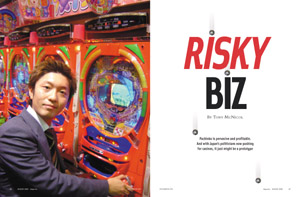 THE MARUHAN PACHINKO TOWER must be one of the few places in Shibuya that is actually noisier inside than on the streets outside. The din of a zillion cascading steel balls assaults one ear and thumping dance music attacks the other; an hour in its day-glow halls might be likened to sitting out a hailstorm in a super-woofer equipped tin shed. Yet the building is full. Pachinko, Japan's homegrown pinball gambling industry, has as many as 20 million players, despite still being technically illegal as a form of gambling and dogged by accusations of underworld connections -- including allegations that the industry is being used as a route for sending money to Kim Jong-Il's North Korea.
THE MARUHAN PACHINKO TOWER must be one of the few places in Shibuya that is actually noisier inside than on the streets outside. The din of a zillion cascading steel balls assaults one ear and thumping dance music attacks the other; an hour in its day-glow halls might be likened to sitting out a hailstorm in a super-woofer equipped tin shed. Yet the building is full. Pachinko, Japan's homegrown pinball gambling industry, has as many as 20 million players, despite still being technically illegal as a form of gambling and dogged by accusations of underworld connections -- including allegations that the industry is being used as a route for sending money to Kim Jong-Il's North Korea.
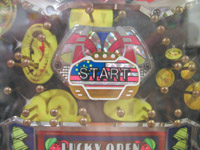 The pachinko industry is huge. According to Osaka University of Commerce's amusement industry research department, Japan's first university gambling research group, pachinko's income is about three times all the various forms of legal gambling in Japan put together. Each year around JPY30 trillion worth of steel balls clatter through the nation's pachinko machines. The amounts of money spent on horse, boat, bicycle and car racing as well as the national lottery are small stakes in comparison.
The pachinko industry is huge. According to Osaka University of Commerce's amusement industry research department, Japan's first university gambling research group, pachinko's income is about three times all the various forms of legal gambling in Japan put together. Each year around JPY30 trillion worth of steel balls clatter through the nation's pachinko machines. The amounts of money spent on horse, boat, bicycle and car racing as well as the national lottery are small stakes in comparison.
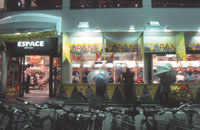 Nomura explains how North and South Koreans became involved in the pachinko industry. "Average Japanese people have tended to see the pachinko industry as shameful ... with at least one foot planted firmly in the world of organized crime. Koreans often haven't been able to find other work [and have ended up in the pachinko industry]. It was also a business that dealt in hard cash rather than social relationships of trust. Now, about one third of the pachinko industry is run by Japanese nationals, another third by South Korean residents in Japan and about another third by North Koreans."
Nomura explains how North and South Koreans became involved in the pachinko industry. "Average Japanese people have tended to see the pachinko industry as shameful ... with at least one foot planted firmly in the world of organized crime. Koreans often haven't been able to find other work [and have ended up in the pachinko industry]. It was also a business that dealt in hard cash rather than social relationships of trust. Now, about one third of the pachinko industry is run by Japanese nationals, another third by South Korean residents in Japan and about another third by North Koreans."
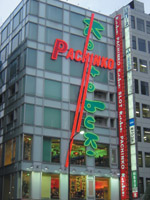 Although he argues that the amount of money sent from Japan to North Korea has been exaggerated, he still believes that JPY10 billion crosses the Japan Sea each year. According to Nomura the bulk of the transfers are made when Koreans with families in the North travel to visit relatives. Given the involvement of North Koreans in pachinko, it seems reasonable to assume that a sizeable chunk of the industry's profits are heading toward Korea in this way.
Although he argues that the amount of money sent from Japan to North Korea has been exaggerated, he still believes that JPY10 billion crosses the Japan Sea each year. According to Nomura the bulk of the transfers are made when Koreans with families in the North travel to visit relatives. Given the involvement of North Koreans in pachinko, it seems reasonable to assume that a sizeable chunk of the industry's profits are heading toward Korea in this way.
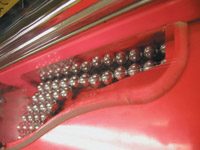 Big plans, but Aoki and the Diet members he represents are the first to acknowledge that the new industry would need careful regulation. Will there be safeguards to keep out the mafia?
Big plans, but Aoki and the Diet members he represents are the first to acknowledge that the new industry would need careful regulation. Will there be safeguards to keep out the mafia?




